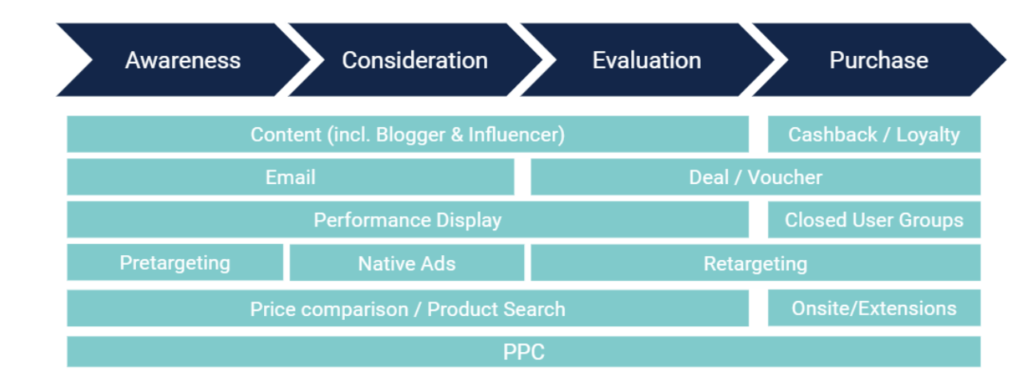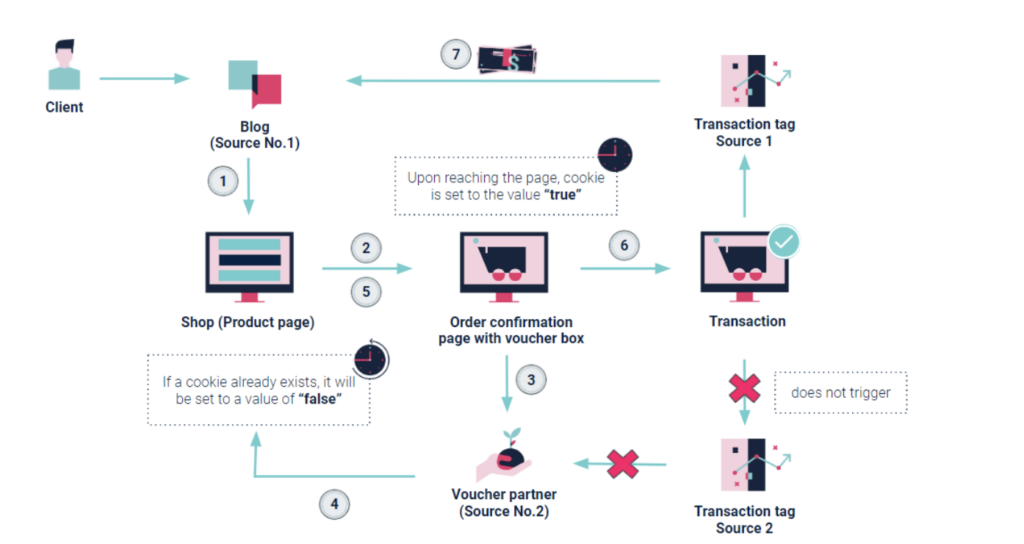
IS THE DEPENDENCE ON VOUCHER PUBLISHERS IN AFFILIATE MARKETING A SELF-MADE PROBLEM?
Target image vs. reality
The wish of advertisers in affiliate marketing is rather for a differentiated publisher mix with a high proportion of content partners. Many advertisers prefer to see their brand in a relevant environment of an elaborately edited article in order to benefit from additional branding effects and to generate reach.
This is of course contrary to the fact that affiliate marketing is a very performance-oriented channel with a focus on conversions, in which most sales are generated with partners who are rather at the end of the customer journey.

Fig.: Affiliate models along the customer journey
One reason for this is that affiliate programmes still predominantly adhere to last-click attribution, which allocates the entire commission exclusively to the partner with the last click before the purchase is completed. All other partners involved in the customer journey are not remunerated, even if they originally triggered the purchase. Of course, this does not correspond to the reality in the purchase decision process and leads to a disadvantage of certain partners.
Also, many advertisers are reluctant to provide further monetary incentives for publishers – especially when it comes to advertising allowance budgets (fixed fee budgets) – in addition to the already agreed CPO, as this is more risky for the advertiser. However, content publishers in particular are dependent on additional budget due to the high effort involved in the creation of corresponding editorial articles, as they would otherwise too often find themselves without any compensation for their efforts due to the “last cookie wins” logic.
In particular, the adherence to the “Last Cookie Wins” logic plays into the hands of the operators of voucher sites – because by now almost no purchase in an online shop is made without searching for a corresponding discount. Who hasn’t done it themselves at some point – during the ordering process, one’s attention is drawn to the voucher field and the searching for suitable discount codes in a new tab. If you visit a voucher site and click on a supposed voucher, you will be redirected to the online shop. If you now complete the order process, the voucher site receives the entire commission, as this is assigned as a “last click”, even if initially another partner led us to the site. However, in this case in particular, it is doubtful whether this partner played a decisive role in achieving the sale and the commission is therefore justified.
Has the problem of dependence on voucher publishers itself been created and how can we ensure that the deadweight effect and tapping mechanism of voucher publishers is reduced?
Even without changing the attribution model, there is in fact a simple way to prevent tapping and to ensure fair remuneration along the customer journey in the best possible way – the introduction of a basket freeze.
What is a basket freeze?
A basket freeze prevents a previously set cookie from being overwritten for a certain period of time if the customer has already been in the shopping basket or has already added products to the basket. This prevents a new cookie from being set if the customer enters the online shop again from another partner during the order process. The duration of a basket freeze is usually between 10 and 30 minutes. This is to ensure that the sale is assigned to the partner who originally drew the customer’s attention to the shop and led to the order.

How can a Basket Freeze be implemented?
The basket freeze should be set up in the order process on the page where the voucher field can be found. The change is made in the Tag Manager, for example, a cookie with the value “true” would be set in the Google Tag Manager, as well as a time period for how long the cookie is valid when a user reaches this page via the first source. A new cookie can only be set after this period has expired. If the user returns to the page with the voucher field via a second source within this period, the value is set to “false” and the previous cookie cannot be overwritten. The basket freeze can include all online marketing channels or be limited to the affiliate channel.

Fig.: Workflow implementation
It is also worth considering excluding the basket freeze for certain publisher segments or selected publishers. Particular consideration should be given to cashback and loyalty partners who return part of their commission to the customer in form of money or points. The systematics of a basket freeze is difficult to understand for the users of corresponding portals, as they assume that if they activate the cashback – even if this happens shortly before the order is completed – it will be credited to them. The danger that customers will file complaints in the form of subsequent booking requests if the cashback is not allocated to them due to the basket freeze activated in the background would therefore be particularly high. The high support effort in processing complaints on the part of these partners could have a negative impact on the partnerships. The technical implementation can be carried out here, for example, using the individual publisher ID from the affiliate network used in each case.
What are the effects of a basket freeze?
Probably the most important advantage of the basket freeze is the assurance of fairer remuneration, as well as the strengthening of the channels or partners that actually brought the customer to the website and led to the conclusion of the purchase. In affiliate marketing, content sites, bloggers and price comparators in particular will benefit from the basket freeze, making them more motivated to further expand their promotion.
If the basket freeze includes all cookies of the marketing mix, there will be a decline in sales, especially in the affiliate channel. Overall, the same number of sales will still be generated, but there will be a shift in sales towards other online marketing channels.
Regardless of this, a decline in sales will be observed, especially among the voucher partners, which may initially lead to resentment among some partners. But with the initial objective of the advertiser when introducing a basket freeze, this effect is certainly desirable. And a basket freeze is already a common procedure in affiliate marketing and should therefore not be an obstacle for these affiliates in the long term, as most of them are already used to dealing with it.










